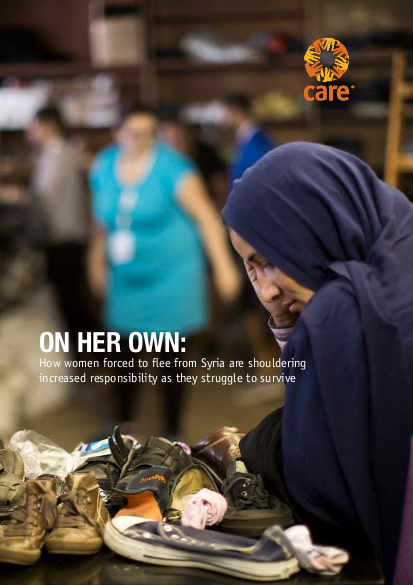
As the Syrian refugee crisis worsens, leading aid agency CARE is reporting a substantial rise in female-headed households, as women flee the country and attempt the perilous journey alone or with their children. According to the charity’s report “On Her Own: How women forced to flee Syria are shouldering increased responsibility as they struggle to survive”, women refugees face additional threats and vulnerabilities as they make the journey through Europe.
CARE’s research suggests an increase in Syrian refugee women fleeing the crisis with their children, unaccompanied by their husbands or other male figures. Women are forced from their homes by fear of being caught up in conflict, of sexual violence, and of their children being conscripted: women constantly face new and unforeseen challenges.
Whether the men have headed abroad before them or been killed in conflict, according to refugee women’s own reports, nearly 40 percent of Syrian households in Jordan are female-headed; a marked rise from two years ago when figures were closer to a quarter. CARE’s findings also suggest a significant presence of female-headed households in Greece too, with 50 percent of families arriving from Syria estimated to be headed by women on their own. Many of these women report feeling more exposed to threats, harassment and violence.
Increasingly, women shoulder the burden of keeping themselves and their children safe. They are invisible victims in one of the greatest displacements of people the world has seen. Of particular concern, nearly 10 percent of Syrian girls in Jordan are forced into early marriage.
The report finds that amid turmoil and immense hardship, women are forging new roles, taking on challenges and responsibilities despite their own highly vulnerable situations. Roles include decision-making on income and expenses, assuming responsibilities outside the home and taking on the role of head of household. However, 95 percent of women say these changes are negative, with an increased risk of gender based violence, and added responsibilities exacerbating the stress of their situations.
Ahead of the two Refugee Summits on 19 and 20 September in New York, which provide a unique opportunity for leaders to commit to concrete action on how to respond to the refugee crisis, CARE has joined forces with UK-based Women for Refugee Women to highlight the plight of refugee women, both those fleeing their country of origin, and those arriving in the UK.
